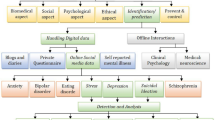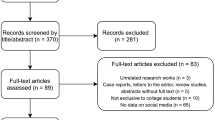Abstract
Purpose of Review
This review provides an overview of recent research which uses social media data in the context of mental health. It also provides an overview of challenges in relation to consent, privacy, and usage of such data.
Recent Findings
A broad range of research has been conducted in recent years, using text-based and visual data from social media platforms, for purposes such as risk detection at the individual level, providing crisis outreach, and developing a better understanding of the lived experience of mental ill-health.
Summary
Challenges remain in relation to obtaining truly informed consent for research using social media data—however platforms allowing data donation may address these concerns. There is an imperative need to ensure that privacy is preserved at all stages of the research process, from data collection, to analysis, and the responsible use of raw data in publications.
Similar content being viewed by others
References
Papers of particular interest, published recently, have been highlighted as: • Of importance •• Of major importance
Obar J, Wildman S. Social media definition and the governance challenge: an introduction to the special issue. Telecommun Policy. 2015;39(9):745–50. https://doi.org/10.1016/j.telpol.2015.07.014.
Kemp S. Digital 2020: 3.8 billion people use social media. https://wearesocial.com/blog/2020/01/digital-2020-3-8-billion-people-use-social-media: We Are Social; 2020.
Naslund JA, Bondre A, Torous J, Aschbrenner KA. Social media and mental health: benefits, risks, and opportunities for research and practice. J Technol Behav Sci. 2020;5:245–57. https://doi.org/10.1007/s41347-020-00134-x.
Coppersmith G, Leary R, Crutchley P, Fine A. Natural language processing of social media as screening for suicide risk. Biomed Inform Insights. 2018;10:1178222618792860. https://doi.org/10.1177/1178222618792860.
Birnbaum ML, Ernala SK, Rizvi AF, Arenare E, R. Van Meter A, De Choudhury M et al. Detecting relapse in youth with psychotic disorders utilizing patient-generated and patient-contributed digital data from Facebook. NPJ Schizophr. 2019;5(1):17. doi:https://doi.org/10.1038/s41537-019-0085-9.
Park S, Kim I, Lee SW, Yoo J, Jeong B, Cha M. Manifestation of depression and loneliness on social networks: a case study of young adults on Facebook. Proceedings of the 18th ACM Conference on Computer Supported Cooperative Work & Social Computing; Vancouver, BC, Canada: Association for Computing Machinery; 2015. p. 557–70.
• Andalibi N, Ozturk P, Forte A. Sensitive self-disclosures, responses, and social support on instagram: the case of #Depression. Proceedings of the 2017 ACM Conference on Computer Supported Cooperative Work and Social Computing; Portland, Oregon, USA: Association for Computing Machinery; 2017. p. 1485–500. Examination of the nature of mental health disclosures on the image sharing social media platform Instagram and a characterisation of the responses to these posts. Authors found that people were using Instagram to acknowledge and normalise experiences of mental ill-health.
Edwards TM, Holtzman NS. A meta-analysis of correlations between depression and first person singular pronoun use. J Res Pers. 2017;68:63–8. https://doi.org/10.1016/j.jrp.2017.02.005.
O'Dea B, Wan S, Batterham PJ, Calear AL, Paris C, Christensen H. Detecting suicidality on Twitter. Internet Interv. 2015;2(2):183–8. https://doi.org/10.1016/j.invent.2015.03.005.
Reece AG, Danforth CM. Instagram photos reveal predictive markers of depression. EPJ Data Sci. 2017;6(1):15. https://doi.org/10.1140/epjds/s13688-017-0110-z.
O'Dea B, Achilles MR, Larsen ME, Batterham PJ, Calear AL, Christensen H. The rate of reply and nature of responses to suicide-related posts on Twitter. Internet Interv. 2018;13:105–7. https://doi.org/10.1016/j.invent.2018.07.004.
Samaritans. Samaritans Radar. https://www.samaritans.org/about-samaritans/research-policy/internet-suicide/samaritans-radar/: Samaritans; n.d.
Live For Tomorrow. Live For Tomorrow Chat impact. Key Metrics Period: 1 May 2019–30 April 2020. 2020.
Pavalanathan U, Choudhury MD. Identity management and mental health discourse in social media. Proceedings of the 24th International Conference on World Wide Web; Florence, Italy: Association for Computing Machinery; 2015. p. 315–21.
Evans M, Donelle L, Hume-Loveland L. Social support and online postpartum depression discussion groups: a content analysis. Patient Educ Couns. 2012;87(3):405–10. https://doi.org/10.1016/j.pec.2011.09.011.
Davidson L, Chinman M, Sells D, Rowe M. Peer support among adults with serious mental illness: a report from the field. Schizophr Bull. 2006;32(3):443–50. https://doi.org/10.1093/schbul/sbj043.
•• Lachmar EM, Wittenborn AK, Bogen KW, McCauley HL. #MyDepressionLooksLike: examining public discourse about depression on Twitter. JMIR Ment Health. 2017;4(4):e43. https://doi.org/10.2196/mental.8141Content analysis of #MyDepressionLooksLike tweets to understand how people discuss depression on Twitter. Seven themes emerged, describing the inner experiences of people with depression, and included dysfunctional thoughts, lifestyle challenges, social struggles, hiding behind a mask, apathy and sadness, self-harm and suicide, and self-care strategies.
Larsen ME, Vaughan P, Bennett J, Boydell K. The ‘BIG Anxiety Project’: using the arts to visually explore public experiences and attitudes to anxiety. J Appl Arts Health. 2018;9(1):85–97. https://doi.org/10.1386/jaah.9.1.85_1.
Anonymous. Cambridge Analytica controversy must spur researchers to update data ethics. Nature. 2018;555(7698):559. https://doi.org/10.1038/d41586-018-03856-4.
John B. Are you ready for general data protection regulation? BMJ. 2018;360:k941. https://doi.org/10.1136/bmj.k941.
• Golder S, Ahmed S, Norman G, Booth A. Attitudes toward the ethics of research using social media: a systematic review. J Med Internet Res. 2017;19(6):e195. https://doi.org/10.2196/jmir.7082A systematic review of user perceptions on using social media for general research. Contains valuable insights into user opinions on ethical topics such as informed consent, privacy concerns, and organisational trust.
•• Ford E, Curlewis K, Wongkoblap A, Curcin V. Public opinions on using social media content to identify users with depression and target mental health care advertising: mixed methods survey. JMIR Ment Health. 2019;6(11):e12942. https://doi.org/10.2196/12942A study investigating user perceptions on using social media for mental health analysis. Contrasting with [21], authors found that informed consent was a critical necessity for mental health–related analysis.
O'Connor D. The apomediated world: regulating research when social media has changed research. J Law Med Ethics. 2013;41(2):470–83. https://doi.org/10.1111/jlme.12056.
Moreno MA, Goniu N, Moreno PS, Diekema D. Ethics of social media research: common concerns and practical considerations. Cyberpsychol Behav Soc Netw. 2013;16(9):708–13. https://doi.org/10.1089/cyber.2012.0334.
Reidenberg J, Breaux T, Cranor L, French B, Grannis A, Graves J, et al. Disagreeable privacy policies: mismatches between meaning and users’ understanding. Berkeley Technol Law J. 2015;30:39.
Powell AC, Singh P, Torous J. The complexity of mental health app privacy policies: a potential barrier to privacy. JMIR Mhealth Uhealth. 2018;6(7):e158. https://doi.org/10.2196/mhealth.9871.
Mikal J, Hurst S, Conway M. Ethical issues in using Twitter for population-level depression monitoring: a qualitative study. BMC Med Ethics. 2016;17(1):22. https://doi.org/10.1186/s12910-016-0105-5.
Beninger K, Fry A, Jago N, Lepps H, Nass L, Silvester H. Research using social media; users’ views. NatCen Soc Res. 2014:1–40.
Monks HE, Cardoso P, Papageorgiou A, Carolan C, Costello LN, Thomas L. Young people’s views regarding participation in mental health and wellbeing research through social media. Int J Emot Educ. 2015;7(1):4–19.
Woodfield K, Morrell G, Metzler K, Blank G, Salmons J, Finnegan J et al. Blurring the boundaries? New social media, new social research: developing a network to explore the issues faced by researchers negotiating the new research landscape of online social media platforms. 2013.
Benton A, Coppersmith G, Dredze M, editors. Ethical research protocols for social media health research. Proceedings of the First ACL Workshop on Ethics in Natural Language Processing; 2017. Outlines guidelines for social media research to ensure the ethical use and adequate protection of data.
Huckvale K, Torous J, Larsen ME. Assessment of the data sharing and privacy practices of smartphone apps for depression and smoking cessation. JAMA Netw Open. 2019;2(4):e192542. https://doi.org/10.1001/jamanetworkopen.2019.2542.
Liu G, Wang C, Peng K, Huang H, Li Y, Cheng W. SocInf: membership inference attacks on social media health data with machine learning. IEEE Trans Comput Soc Syst. 2019;6(5):907–21. https://doi.org/10.1109/TCSS.2019.2916086.
•• Naslund JA, Aschbrenner KA, McHugo GJ, Unutzer J, Marsch LA, Bartels SJ. Exploring opportunities to support mental health care using social media: a survey of social media users with mental illness. Early Interv Psych. 2019;13(3):405–13. https://doi.org/10.1111/eip.12496Survey of social media users with mental ill-health exploring the potential for social media to support mental health care. Participants were overwhelmingly positive about the use of social media for mental health, particularly for coping with symptoms and promoting overall mental health and well-being.
Sleigh J. Experiences of donating personal data to mental health research: an explorative anthropological study. Biomed Inform Insights. 2018;10:1178222618785131.
Author information
Authors and Affiliations
Corresponding author
Ethics declarations
Conflict of Interest
The authors declare that they have no conflicts of interest.
Human and Animal Rights and Informed Consent
All reported studies/experiments with human or animal subjects performed by the authors have been previously published and complied with all applicable ethical standards (including the Helsinki declaration and its amendments, institutional/national research committee standards, and international/national/institutional guidelines).
Additional information
Publisher’s Note
Springer Nature remains neutral with regard to jurisdictional claims in published maps and institutional affiliations.
This article is part of the Topical Collection on Psychiatry in the Digital Age
Rights and permissions
About this article
Cite this article
Nicholas, J., Onie, S. & Larsen, M.E. Ethics and Privacy in Social Media Research for Mental Health. Curr Psychiatry Rep 22, 84 (2020). https://doi.org/10.1007/s11920-020-01205-9
Accepted:
Published:
DOI: https://doi.org/10.1007/s11920-020-01205-9




